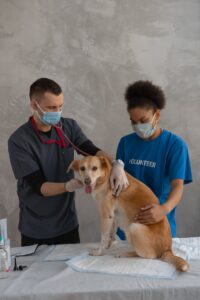Transitioning to a new country can be a daunting experience, especially for professionals in specialized fields like veterinary medicine but as a veterinary technician eases the navigation greatly. If you’re a veterinarian planning to relocate to the United States, working as a veterinary technician can be an excellent stepping stone while you prepare for your licensing exams. This post aims to provide comprehensive information on how to pursue this path, including state regulations, and practical advice. It is also a response to several people who asked me on one of my YouTube videos about Preaing for the licensing exams.
The Role of a Veterinary Technician
Before diving into the specifics, it’s important to understand what a veterinary technician does. Veterinary technicians, often referred to as vet techs, play a crucial role in animal care. Their responsibilities include assisting veterinarians during surgeries, performing diagnostic tests, administering medications, and providing general care to animals. This role requires a blend of technical skills and compassionate care, making it an ideal position for veterinarians transitioning into the U.S. veterinary field.
Why Work as a Veterinary Technician?
Working as a veterinary technician offers several benefits for foreign veterinarians:
– Hands-On Experience: It provides an opportunity to gain practical, hands-on experience in the U.S. veterinary field.
– Professional Integration: Working as a vet tech allows you to integrate into the professional community, understand the local industry standards, and network with other veterinary professionals.
– Financial Stability: It ensures you can comfortably maintain financial stability while preparing for your veterinary licensing exams.
– Skill Enhancement: The role helps enhance your skills and stay updated with the latest veterinary practices and technologies.
Having mentioned these, it is important to remember that the ECFVG program is a long and tasking one but there’s a need to integrate into the system, and being a Veterinary technician is a great approach.

Here are States Allowing Veterinary Technicians to Work Without Licenses or Certifications.
One of the most frequently asked questions by veterinarians moving to the U.S. is about state regulations regarding working as a veterinary technician. While each state has specified regulations, some states allow you to work without a license or certification. Here are the states where you can work as a veterinary technician without necessarily having a license:
- Florida
- Massachusetts
- Texas
- Connecticut
- Maryland
- Vermont
In the states listed above, although you can work without a license, having a certification or long-term experience can significantly boost your pay and job prospects.
States Requiring Licenses or Certifications to Work as Veterinary Technician
Conversely, there are states where you cannot work as a veterinary technician without a license or certification. These include:
- Georgia
- Indiana
- Michigan
- Oregon
- Colorado
- California
- South Carolina
- Tennessee
- Montana
- Nevada
- Arkansas
- Arizona
- North Carolina
- Missouri
- Utah
- Virginia
- Alaska
- Wisconsin
- Ohio
- Pennsylvania
- Maine
- Illinois
- New York
- West Virginia
- Mississippi
- Washington State
Becoming Veterinary Technicians: The Steps
If you’re ready to pursue this path, here are the steps to becoming a veterinary technician in the U.S.:
- Research State Requirements: Begin by researching the specific requirements for veterinary technicians in the state you plan to move to. Each state has different regulations, so it’s crucial to understand what is required.
- Educational Credentials: Although some states do not require a formal education, having a degree from an accredited veterinary technology program can enhance your job prospects.
- Gain Experience: Practical experience is invaluable. Volunteering at animal shelters, clinics, or hospitals can provide you with the necessary skills and experience.
- Certification: Consider obtaining certification from the American Association of Veterinary State Boards (AAVSB) or the National Association of Veterinary Technicians in America (NAVTA). Certification can open up more job opportunities and potentially higher pay.
- Job Search: Start your job search by applying to veterinary clinics, hospitals, and animal shelters. Networking with other veterinary professionals can also help you find job opportunities.
Preparing for Veterinary Licensing Exams While Working as a Veterinary Technician
While working as a veterinary technician, it’s important to continue preparing for your veterinary licensing exams. Here are some tips to help you succeed:
- Study Resources: Utilize study resources such as textbooks, online courses, and study groups. The American Veterinary Medical Association (AVMA) offers a wealth of information and resources for exam preparation.
- Exam Prep Courses: Consider enrolling in exam preparation courses. These courses are designed to help you understand the exam format and content, and they often provide practice exams.
- Time Management: Balancing work and study can be challenging. Develop a study schedule that allows you to dedicate sufficient time to exam preparation while managing your work responsibilities.
- Stay Informed: Keep yourself updated with the latest developments in veterinary medicine by reading journals, attending conferences, and participating in continuing education courses.
Practical Advice for Transitioning to the U.S.
Relocating to a new country involves more than just professional adjustments. Here are some practical tips to help you transition smoothly:
- Cultural Adaptation: Take time to understand and adapt to the cultural differences in the U.S. This includes understanding workplace etiquette, communication styles, and social norms.
- Networking: Building a professional network can be invaluable. Join professional organizations such as the AVMA, attend industry events, and connect with other veterinary professionals on platforms like LinkedIn. Also, look out for foreign Vets who are currently Veterinary technicians
- Legal Documentation: Ensure all your legal documentation is in order, including visas, work permits, and any necessary certifications.
- Housing: Find suitable housing close to your workplace. Consider factors such as commute times, cost of living, and community amenities.
- Financial Planning: Plan your finances carefully. This includes understanding your salary expectations, cost of living, and budgeting for unexpected expenses.
The Importance of Continuing Education
Continuing education is crucial in the veterinary field. It ensures that you stay updated with the latest practices, technologies, and advancements in veterinary medicine. Here are some ways to continue your education:
- Online Courses: There are numerous online courses available that cover various aspects of veterinary medicine. Platforms like Coursera and Udemy offer courses on animal care, diagnostic techniques, and more.
- Workshops and Seminars: Attend workshops and seminars to gain hands-on experience and learn from industry experts.
- Professional Journals: Subscribe to professional journals such as the Journal of the American Veterinary Medical Association (JAVMA) to stay informed about the latest research and developments in the field.
- Certifications: Consider obtaining additional certifications in specialized areas of veterinary medicine. This can enhance your skills and make you more marketable.
Embracing Technology in Veterinary Practice
In today’s digital age, embracing technology is crucial for staying competitive and efficient in the veterinary field. Here are some ways technology can enhance your practice:
- Telemedicine: With the rise of telehealth, veterinarians can now offer consultations and follow-ups via video calls. This is especially beneficial for clients in remote areas or those with mobility issues.
- Electronic Health Records (EHRs): Switching to electronic health records can streamline your practice, making it easier to access and manage patient information, schedule appointments, and track treatment plans.
- Diagnostic Tools: Advanced diagnostic tools like digital radiography, ultrasound, and MRI can provide more accurate diagnoses and improve treatment outcomes.
- Practice Management Software: Implementing practice management software can help with scheduling, billing, inventory management, and client communication, allowing you to focus more on patient care.
Building a Client Base {This is for Veterinarians who have a plan to own a practice later on}
As you establish yourself in the U.S., building a solid client base is essential for your success. Some clinics will allow you the opportunity to learn as a veterinary technician too. Here are some strategies to attract and retain clients:
- Online Presence: Create a professional presence and make sure you maintain an active social media presence. Share informative content, client testimonials, and updates about your practice to engage with potential clients. You can use permitted materials at your workplace (as a veterinary technician) to gain more insights to share with others.
- Community Involvement: Participate in community events, offer free workshops or seminars, and engage with local pet owners. Building relationships within the community can lead to word-of-mouth referrals.
- Exceptional Service: Provide exceptional care and customer service. Clients are more likely to return and refer others if they have a positive experience with your practice. Use your veterinary technician roles to build this skill
- Loyalty Programs: Consider implementing loyalty programs or offering discounts for regular clients. This can encourage repeat visits and build long-term relationships.

For more detailed information and resources, check out my YouTube channel, where I share insights and tips on working as a veterinary technician, preparing for licensing exams, and transitioning to the U.S. veterinary field. Whether you’re a seasoned veterinarian or an aspiring professional, my channel offers valuable content to help you succeed in your journey. I have also shared some basic routes to relocating to the United States. I believe you will find them useful. You may also want to explore my social media platforms for more in-depth videos on becoming a veterinary technician in the U.S., and other topics regarding veterinary medicine professionals, pet foods and products, and navigating life after vet school, how I am also journeying to become licensed in the United State and so much more. There, you can stay updated with the latest tips and advice. Click here!
By following these guidelines and leveraging the resources available, you can make a smooth transition to the U.S. veterinary field and continue to make a positive impact on animal health and welfare. Good luck on your journey!
